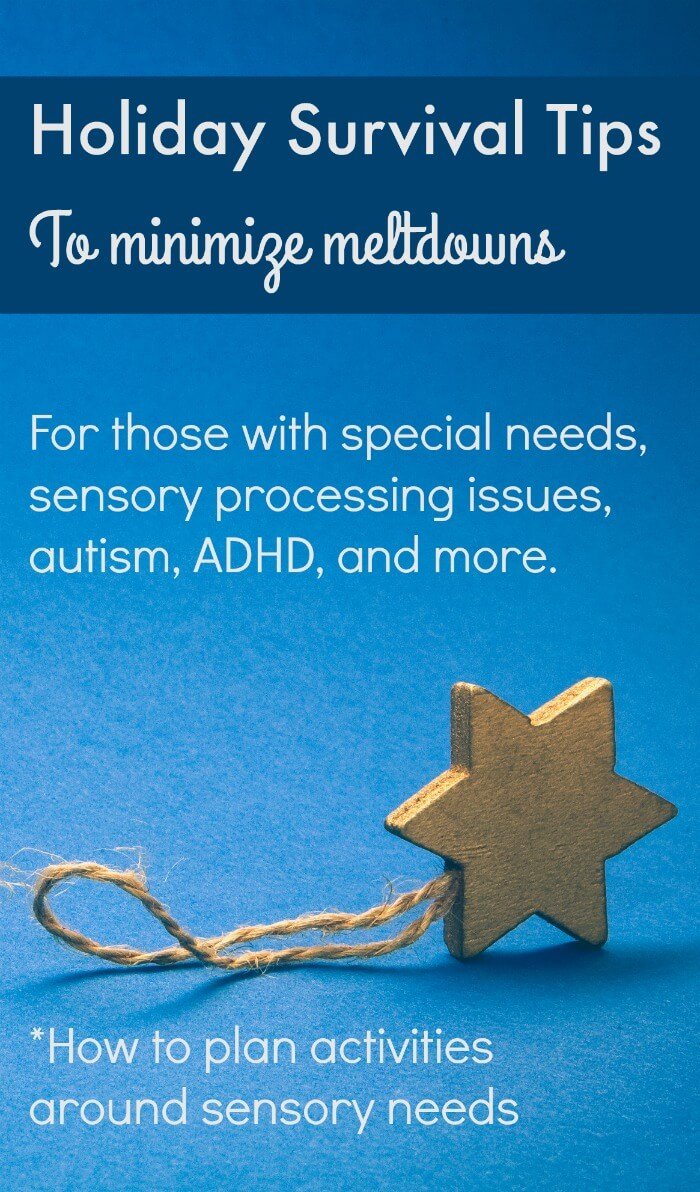
Christmas, my child, is love in action. Every time we love, every time we give, it’s Christmas. – Dale Evans
For families who have fond memories of Christmas activities, special food treats, and the anticipation of unwrapping presents on the big day, it might come as a surprise how grumpy your sensory-sensitive child is when it comes to the ‘joy’ of the season.
Remember, your child is not you. What your child enjoys may very well be completely different than what you enjoyed as a child. Honor them for who they are, and enjoy the moments as they come.
To help your child with sensory integration dysfunction, it is helpful to streamline activities, make sure you plan on plenty of time to decompress, and keep key routines in place, and focus on one or two activities a week rather than packing in everything possible.
Routines and Meals
As tempting it is to deviate from routines when you have houseguests, are visiting family for the holidays (Traveling? Check out these gift ideas to keep peace on a road trip), or have evening activities, routines are the structure needed so that your sensitive child knows exactly what to expect at this part of his day.
Key times to keep your routines:
- Wake up
- Meal times
- After school (if needed, come home, do your routine, and then head back out – the extra 20 minutes is worth it!)
- Going to bed
Meals and Food: For the child with sensory issues, all the change of the season is a lot to handle. All the seasonal foods may just send them over the edge – if your child has sensory needs it’s a good idea to not fight the food fight right now. If they want to decline the special holiday dinner in favor of yogurt and bananas, don’t stress anyone out by using this time to try to expand their horizons. New food introductions can be done during a less stressful time.
If you do want to get on top of picky eating, read about how a dietary change can actually make children more receptive to new foods here – I would just recommend starting mid January rather right in the middle of the holidays :)
Activities That Calm Rather Than Stress
When choosing activities to participate in as a family, keep the child’s sensory needs in mind, as well as when their ‘good’ time of day is. If your child is a night owl, going out after dinner is fun. If they are more calm in the morning, choose morning activities.
Here are some activity and regulation ideas for different sensory preferences:
- Visual seeking: Look at lights, watch parades, enjoy the busy-ness of the mall, Christmas movies running but muted.
- Visual avoidant: Candelight services, dim the lights at home and just use the tree or a fire to light up the living room, avoid excessive decorations, use lights that do not flicker or flash. Encourage use of sunglasses when needed to ‘mute’ the visual stimulation.
- Auditory seeking: Music! Enjoy concerts, caroling, plays, and singing at church, provide headphones and allow noisemaking with bells, musical instruments, and keeping white noise running in the bedroom.
- Auditory avoidant: Crafts such as stringing popcorn, making gingerbread houses, cutting snow flakes, nature activities like a nature walk or sledding, visiting a state park while everyone else is busy shopping, providing noise-canceling headphones when needed.
- Tactile seeking: Heavy work – carrying things in from the car, building a snow man, helping with the Christmas lights, having a small tree that they can take the ornaments off and put them back on, sledding, going on hikes, swimming (we’re swimming every week this season at an indoor pool), therapy putty, play dough, stress balls. Car rides are much more fun when the tactile child can finger paint on the car windows (keep this in the back seat so visibility isn’t decreased) with lotion.
- Tactile avoidant: Watch the seams on clothing – don’t stress about dressing up (uncomfortable clothes will stress this child out more than others), encourage them to feel involved without having to do anything like touch cookie dough or touch the tree as you’re decorating it. Encourage what they want to do, and don’t push them to have to deal with different touches at this stressful time of the season.
The path of least resistance is key – nobody has fun when children are melting down, and whatever can be done to minimize meltdowns is ideal.
Learn how to heal leaky gut

60-page ebook of all my best GAPS Diet (Gut and Psychology Syndrome) articles all in one place.



